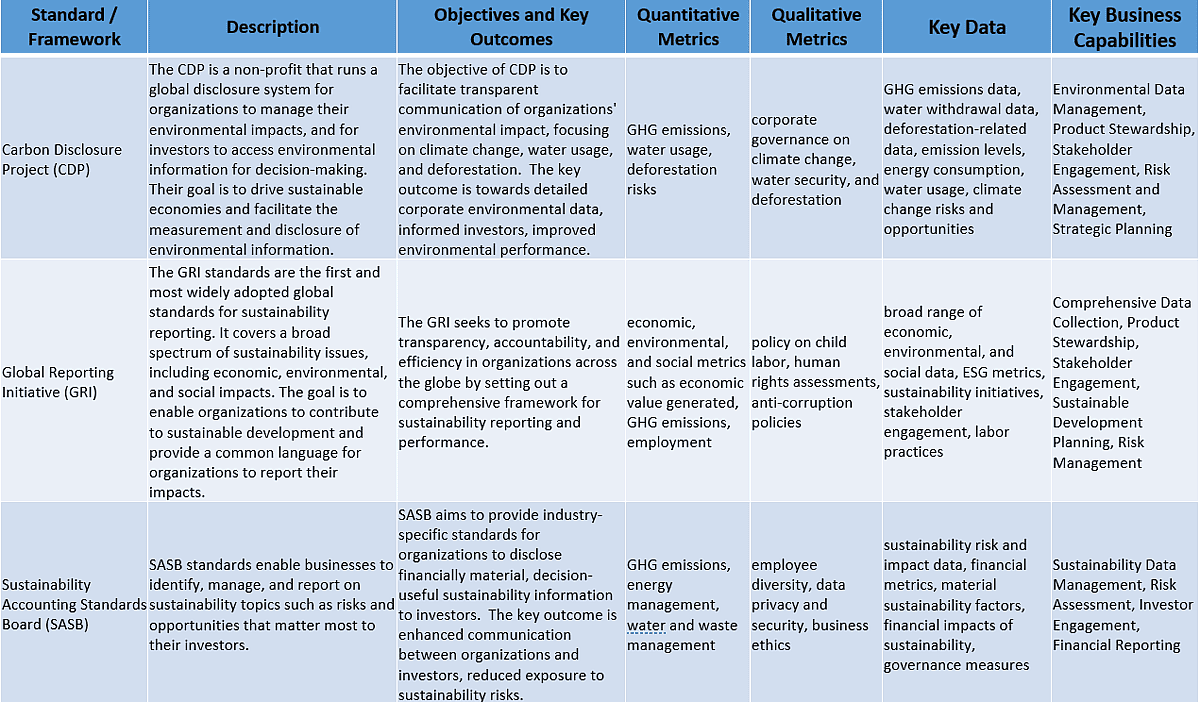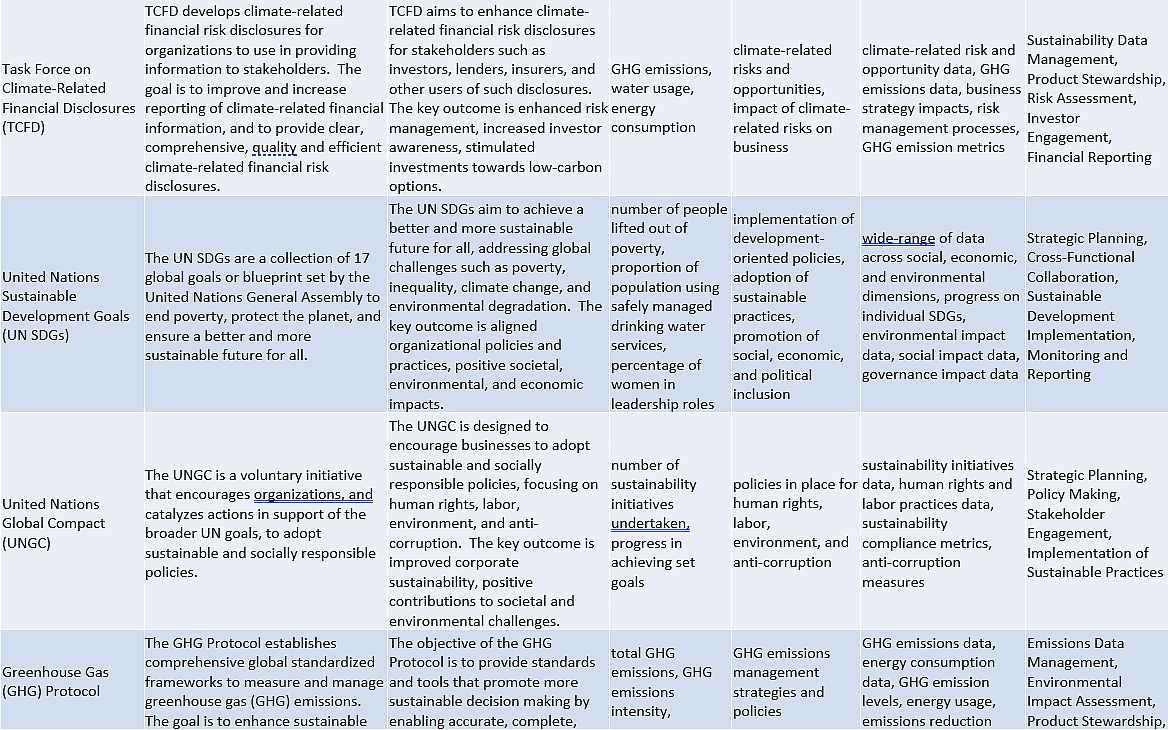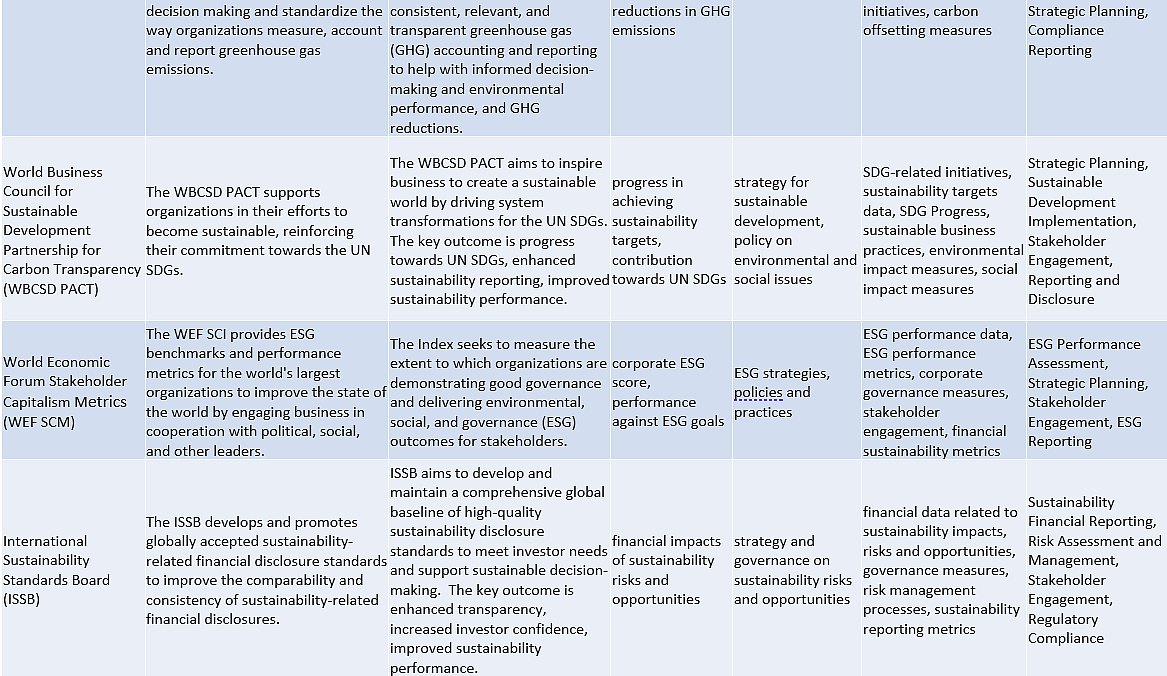Opinion & Analysis
Navigating the Landscape of ESG Reporting — A Deep-dive Into Key Standards and Frameworks
Enterprise Information Architect Rachelle Beltejar highlights that sustainability has become an undeniable imperative for organizations that require a framework to track, measure, and report progress. She explores some of the most common standards and frameworks.
Written by: Rachelle Beltejar
Updated 1:54 PM UTC, Sun September 3, 2023

In the previous article, “What Is Sustainability? Why Should An Enterprise Architect Care?” I introduced the meaning and importance of sustainability in the context of Enterprise Architecture (EA). In this second installment, I will outline the most prominent sustainability standards and frameworks that organizations use to share their performance and impact on a wide range of sustainability topics, as well as effective stakeholder communication efforts.
These guidelines serve as crucial tools for EAs and the data community to steer their organizations toward sustainable practices.
Sustainability has become an undeniable imperative for organizations that require a framework to track, measure, and report progress. It also requires standards to enable accurate, complete, consistent, relevant, and transparent reporting.
With a multitude of sustainability standards and frameworks available, this article provides an overview of the most commonly used, to provide EAs and the data community with a high-level understanding of how they can be used or applied.
The most common topics include: 1. Greenhouse gas (GHG) emissions 2. Energy consumption and efficiency 3. Water use and conservation 4. Waste generation and management 5. Environmental impacts and biodiversity 6. Climate change adaptation and resilience 7. Supply chain management 8. Social impact and human rights 9. Labor practices and employee rights and 10. Governance and accountability
Now, let us explore some of the most common standards and frameworks.



Definitions of terms used in the tables:
Quantitative Metrics: These are numerical data points or indicators that can be measured, like the volume of emissions.
Qualitative Metrics: These are subjective evaluations or descriptive characteristics, such as the effectiveness of a policy.
Key Data: This is data that has been identified as being of critical importance to using, applying, or implementing the Standard or Framework
Key Business Capabilities: A business capability is the ability for an organization to perform a coordinated set of tasks, utilizing organization assets, for the achievement of a particular outcome. A key business capability is a strategic ability that the business needs to achieve its goals and objectives, and it often includes people, processes, and technology.
While these frameworks provide guidelines for sustainability reporting, the specific metrics disclosed (both qualitative and quantitative) can vary greatly depending on the nature of the organization, its sector, and its specific sustainability challenges and goals.
It is important to understand that no one-size-fits-all approach exists but the following can be taken into consideration as to which of these standards and frameworks to implement in your organization:
Goals and objectives, industry sector, geographic presence, stakeholder expectations, breadth and materiality of sustainability issues, investor relations, regulatory and compliance requirements, interoperability, level of detail and complexity, resource availability, and community and peer adoption.
Navigating the landscape of sustainability reporting standards and frameworks can be a complex task, given their diversity in focus and scope. Ultimately, as EAs and data leaders, we play a crucial role in assisting our organizations in this journey toward greater transparency, which is a key principle of our ESG and sustainability approach.
By leveraging these standards and frameworks, we can drive our organizations forward, aligning our strategies with the global goal of sustainable development, and contributing to a healthier, more equitable world.
In the next article, we will explore the role of enterprise architects and data leaders in enabling the sustainability journey within their organizations. This overview will talk about data foundations, data stewardship, quality, and data points needed for data-driven decision making when delivering sustainability outcomes. So, stay tuned!
About the author:
Rachelle Beltejar is a strategic, results-oriented IT professional with over 20 years of progressive experience. She is currently an Enterprise Information Architect with Dell Technologies leading the Enterprise Information Management and Data Strategy initiatives for Sustainability, the Subscription business, and Product and Sales Data Subject Areas. Prior to this, she had different IT roles (Software Engineer, Consultant, Systems Analyst, Solutions Architect, Program Manager, Analytics Leader and Enterprise Architect) for Materials Science, Utilities, and Consulting Companies.
Over her career she has spearheaded scalable transformation initiatives in the realm of Manufacturing 4.0, Next Generation Data Platforms, Digital Thread, and Artificial Intelligence. She is passionate in leading a diverse and inclusive organization by inspiring and motivating talents so they can bring their best self to work. Rachelle has a Bachelor’s Degree in Computer Engineering from Mapua Institute of Technology and an MBA from Northwood University.
References:
(Carbon Disclosure Project, n.d.)
(Global Reporting Initiative, n.d.)
(Sustainability Accounting Standards Board, n.d.)
(Task Force on Climate-Related Financial Disclosure, n.d.)
(United Nations Sustainable Development Goals, n.d.)
(United Nations Global Compact, n.d.)
(Greenhouse Gas Protocol, n.d.)
(WBCSD Partnership for Carbon Transparency, n.d.)
(World Economic Forum Stakeholder Capitalism Metrics, n.d.)
(International Sustainability Standards Board, n.d.)


